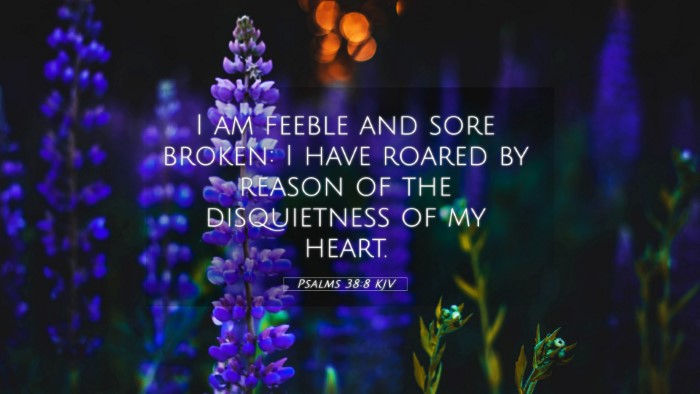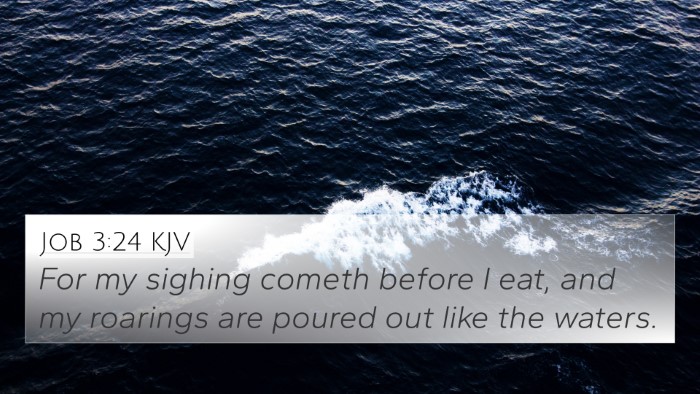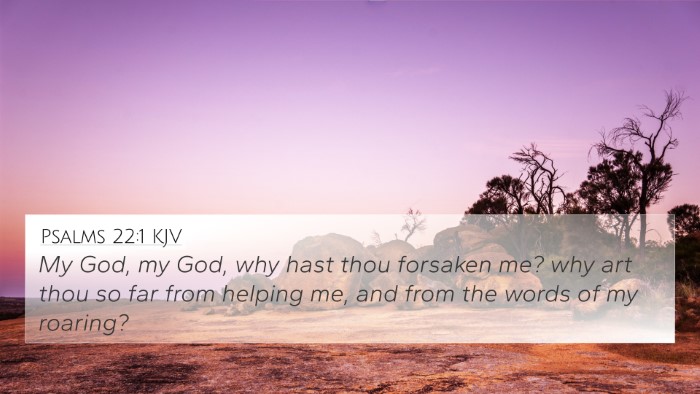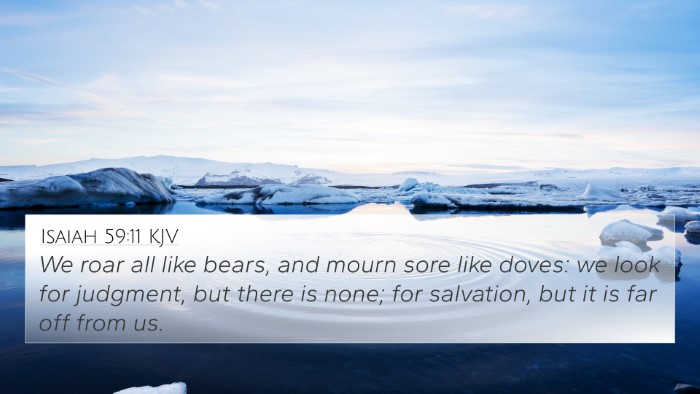Psalms 38:8 - Summary and Interpretation
Psalms 38:8 states:
"I am feeble and sore broken: I have roared by reason of the disquietness of my heart."
This verse offers a profound expression of human sorrow and weakness, depicting a state of distress and emotional turmoil. The psalmist, traditionally understood to be David, shares an intimate reflection of his soul's struggle amidst physical and spiritual afflictions.
Meaning and Insights from Public Domain Commentaries
Insights from several public domain commentaries shed light on the nuances of this verse:
-
Matthew Henry's Commentary:
Henry emphasizes the deep sense of anguish conveyed in this verse. He interprets "feeble and sore broken" as depicting not just physical ailments, but emotional and spiritual desolation. The phrase "have roared" is indicative of the intense pain the psalmist is undergoing, akin to an animal's cry of distress. This illustrates the desperate plea for relief and God's mercy in times of suffering.
-
Albert Barnes' Notes:
Barnes highlights the idea of being overwhelmed by the weight of one’s sins and the unbearable nature of guilt. He suggests that the disquietness of the heart may refer to a troubled conscience. This struggle reflects the universal experience of feeling broken and despondent, often calling for divine intervention and solace.
-
Adam Clarke's Commentary:
Clarke offers a perspective on the physical manifestations of spiritual distress. He notes that the term "roared" suggests a cry that resonates deeply within, showcasing the intersection of anguish and the need for healing. Clarke articulates how this verse serves as a reminder of the importance of bringing one's sufferings before God.
Cross-References for Psalms 38:8
To further understand the contextual background of Psalms 38:8, we can explore several Bible verses that relate to similar themes of distress and sorrow:
- Psalm 6:6 - "I am weary with my groaning; all the night make I my bed to swim; I water my couch with my tears." - This verse reflects the intensity of sorrow akin to that expressed in Psalms 38:8.
- Psalm 51:17 - "The sacrifices of God are a broken spirit: a broken and a contrite heart, O God, thou wilt not despise." - Emphasizing the value of humility in moments of despair.
- Isaiah 38:14 - "Like a crane or a swallow, so did I chatter: I did mourn as a dove: mine eyes fail with looking upward: O Lord, I am oppressed; undertake for me." - Another expression of anguish similar to the psalmist's plea.
- Job 30:20 - "I cry unto thee, and thou dost not hear me: I stand up, and thou regardest me not." - Job's lament echoes the feelings of abandonment found in Psalms 38.
- Lamentations 3:19 - "Remembering mine affliction and my misery, the wormwood and the gall." - Reflects on the deep sorrow that stems from suffering.
- Matthew 26:38 - "Then saith he unto them, My soul is exceeding sorrowful, even unto death: tarry ye here, and watch with me." - The sorrowing spirit of Jesus showcases deep emotional distress, paralleling the psalmist's experience.
- Philippians 4:6-7 - "Be careful for nothing; but in every thing by prayer and supplication with thanksgiving let your requests be made known unto God." - Although it offers reassurance, it emphasizes the importance of presenting our struggles to God.
Thematic Connections and Reflections
Psalms 38:8 serves as a reminder of the intricate web of connections between various Bible verses that explore themes of suffering, repentance, and divine solace:
- Human Frailty: Each of these verses illustrates aspects of human frailty and the emotional toll of sin and suffering.
- Divine Mercy: The longing for God's mercy and intervention is a common thread, particularly in expressions of sorrow and plea for help.
- Brokenness and Restoration: The concept of being broken before God is a pivotal theme in the Bible, suggesting that true healing comes from acknowledging one's weakness.
Conclusion
Ultimately, Psalms 38:8 encapsulates the raw emotion of suffering and the deeply personal nature of one's relationship with God during trials. Through the insights of various biblical commentaries and cross-references, we can appreciate the extensive dialogues present within Scripture regarding pain, repentance, and the hope for restoration.
In exploring this verse, we are prompted to engage in a deeper examination of how to use Bible cross-references effectively. Utilizing a Bible concordance or a cross-reference Bible study guide can greatly enhance our understanding of these connections. Each verse not only stands alone but also interacts dynamically with others, creating a rich tapestry of theological reflection and personal insight.







